Family Dynamics: Examining Academic Performance and Same-Sex Parents
VerifiedAdded on 2023/04/21
|10
|2266
|212
Essay
AI Summary
This essay examines the academic performance of children raised by same-sex parents, challenging prevalent prejudices and generalizations. Through an analysis of several research articles, the essay argues that there is no significant difference in academic outcomes between children of same-sex and heterosexual parents. The analysis covers various factors influencing academic performance, such as parental involvement, graduation rates, and retention levels. The essay reflects on personal beliefs and the importance of eliminating discrimination, concluding that academic performance is not inherently linked to the parents' gender. It references multiple studies to support the thesis, emphasizing the need for equal opportunities and unbiased evaluation of children's academic achievements, with the aim of promoting a more inclusive and equitable understanding of family dynamics.
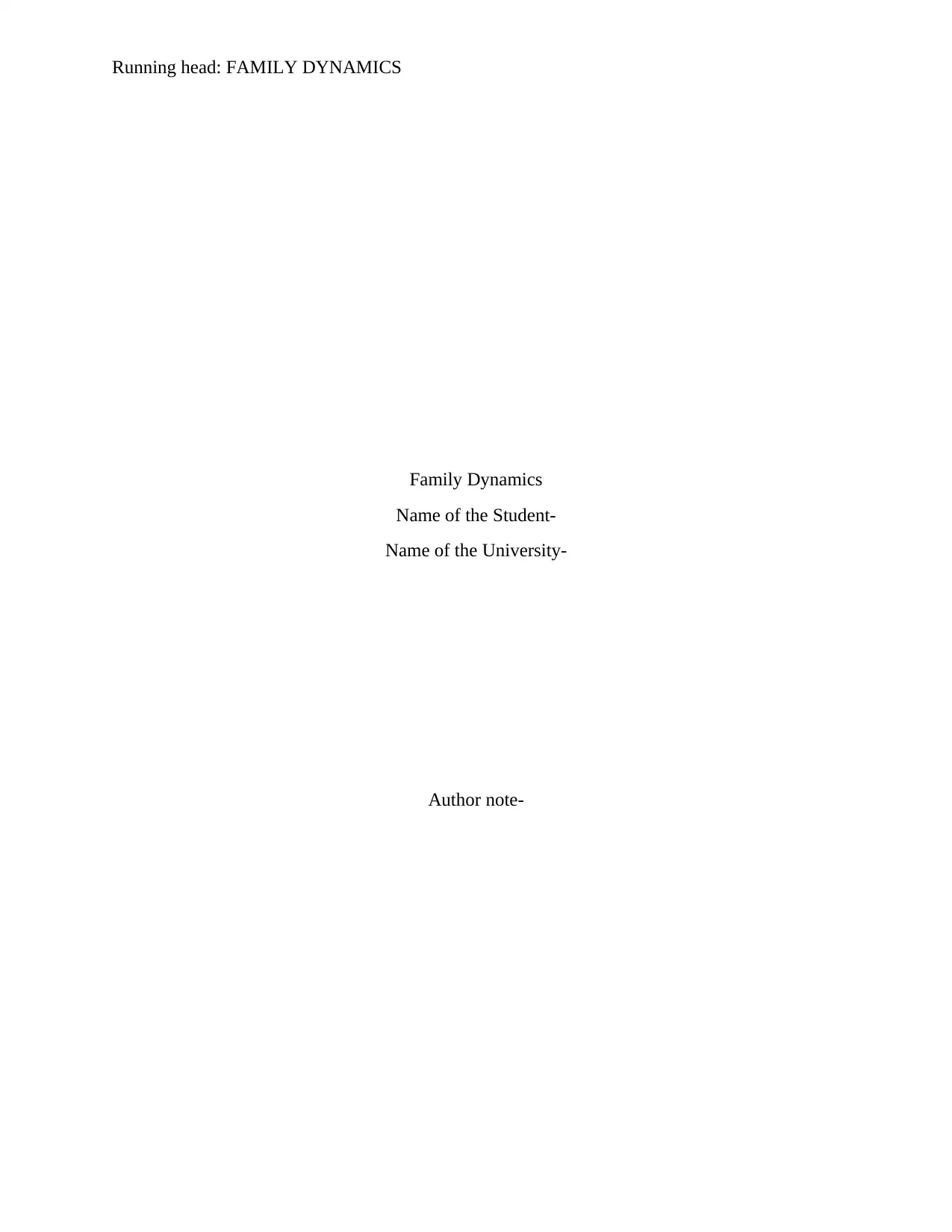
Running head: FAMILY DYNAMICS
Family Dynamics
Name of the Student-
Name of the University-
Author note-
Family Dynamics
Name of the Student-
Name of the University-
Author note-
Paraphrase This Document
Need a fresh take? Get an instant paraphrase of this document with our AI Paraphraser
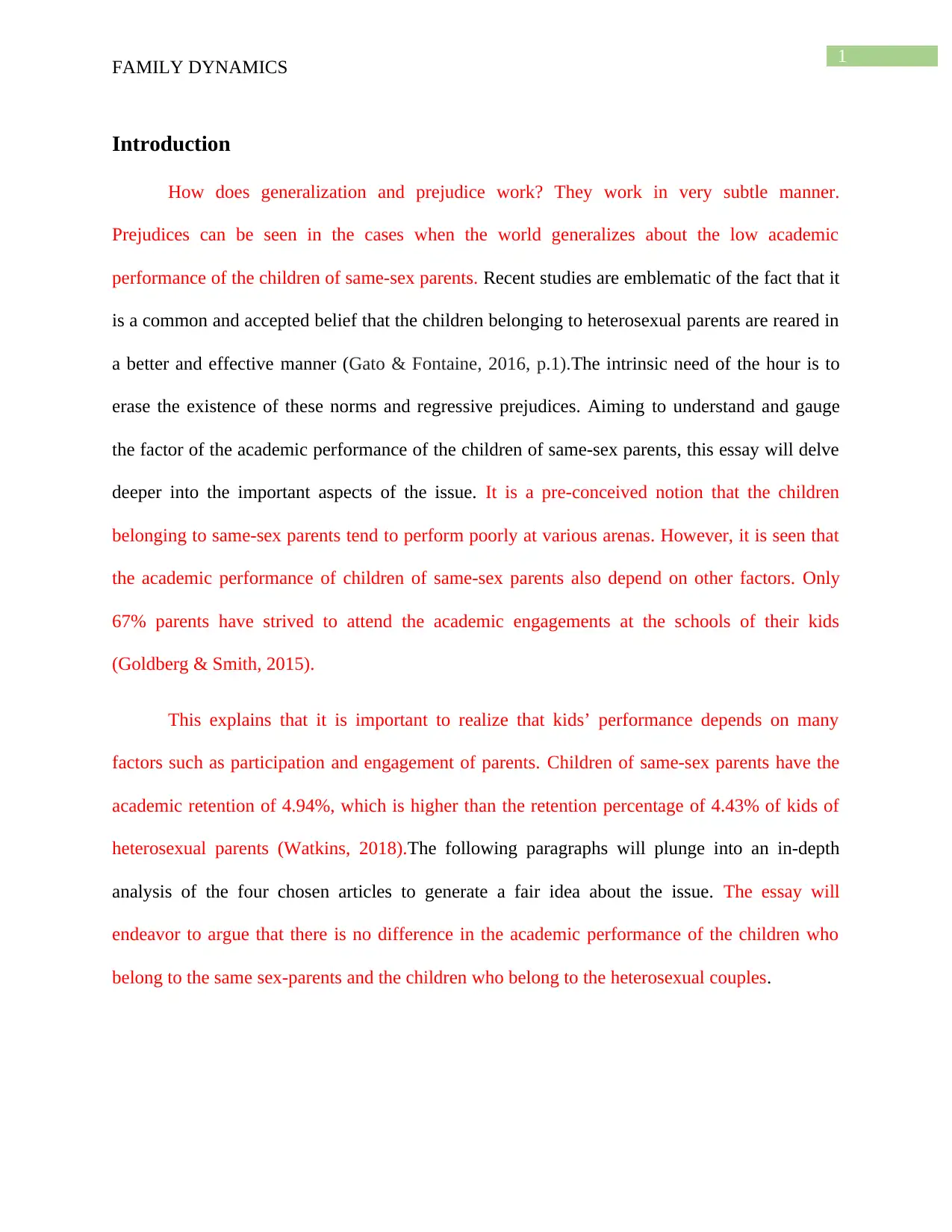
1
FAMILY DYNAMICS
Introduction
How does generalization and prejudice work? They work in very subtle manner.
Prejudices can be seen in the cases when the world generalizes about the low academic
performance of the children of same-sex parents. Recent studies are emblematic of the fact that it
is a common and accepted belief that the children belonging to heterosexual parents are reared in
a better and effective manner (Gato & Fontaine, 2016, p.1).The intrinsic need of the hour is to
erase the existence of these norms and regressive prejudices. Aiming to understand and gauge
the factor of the academic performance of the children of same-sex parents, this essay will delve
deeper into the important aspects of the issue. It is a pre-conceived notion that the children
belonging to same-sex parents tend to perform poorly at various arenas. However, it is seen that
the academic performance of children of same-sex parents also depend on other factors. Only
67% parents have strived to attend the academic engagements at the schools of their kids
(Goldberg & Smith, 2015).
This explains that it is important to realize that kids’ performance depends on many
factors such as participation and engagement of parents. Children of same-sex parents have the
academic retention of 4.94%, which is higher than the retention percentage of 4.43% of kids of
heterosexual parents (Watkins, 2018).The following paragraphs will plunge into an in-depth
analysis of the four chosen articles to generate a fair idea about the issue. The essay will
endeavor to argue that there is no difference in the academic performance of the children who
belong to the same sex-parents and the children who belong to the heterosexual couples.
FAMILY DYNAMICS
Introduction
How does generalization and prejudice work? They work in very subtle manner.
Prejudices can be seen in the cases when the world generalizes about the low academic
performance of the children of same-sex parents. Recent studies are emblematic of the fact that it
is a common and accepted belief that the children belonging to heterosexual parents are reared in
a better and effective manner (Gato & Fontaine, 2016, p.1).The intrinsic need of the hour is to
erase the existence of these norms and regressive prejudices. Aiming to understand and gauge
the factor of the academic performance of the children of same-sex parents, this essay will delve
deeper into the important aspects of the issue. It is a pre-conceived notion that the children
belonging to same-sex parents tend to perform poorly at various arenas. However, it is seen that
the academic performance of children of same-sex parents also depend on other factors. Only
67% parents have strived to attend the academic engagements at the schools of their kids
(Goldberg & Smith, 2015).
This explains that it is important to realize that kids’ performance depends on many
factors such as participation and engagement of parents. Children of same-sex parents have the
academic retention of 4.94%, which is higher than the retention percentage of 4.43% of kids of
heterosexual parents (Watkins, 2018).The following paragraphs will plunge into an in-depth
analysis of the four chosen articles to generate a fair idea about the issue. The essay will
endeavor to argue that there is no difference in the academic performance of the children who
belong to the same sex-parents and the children who belong to the heterosexual couples.
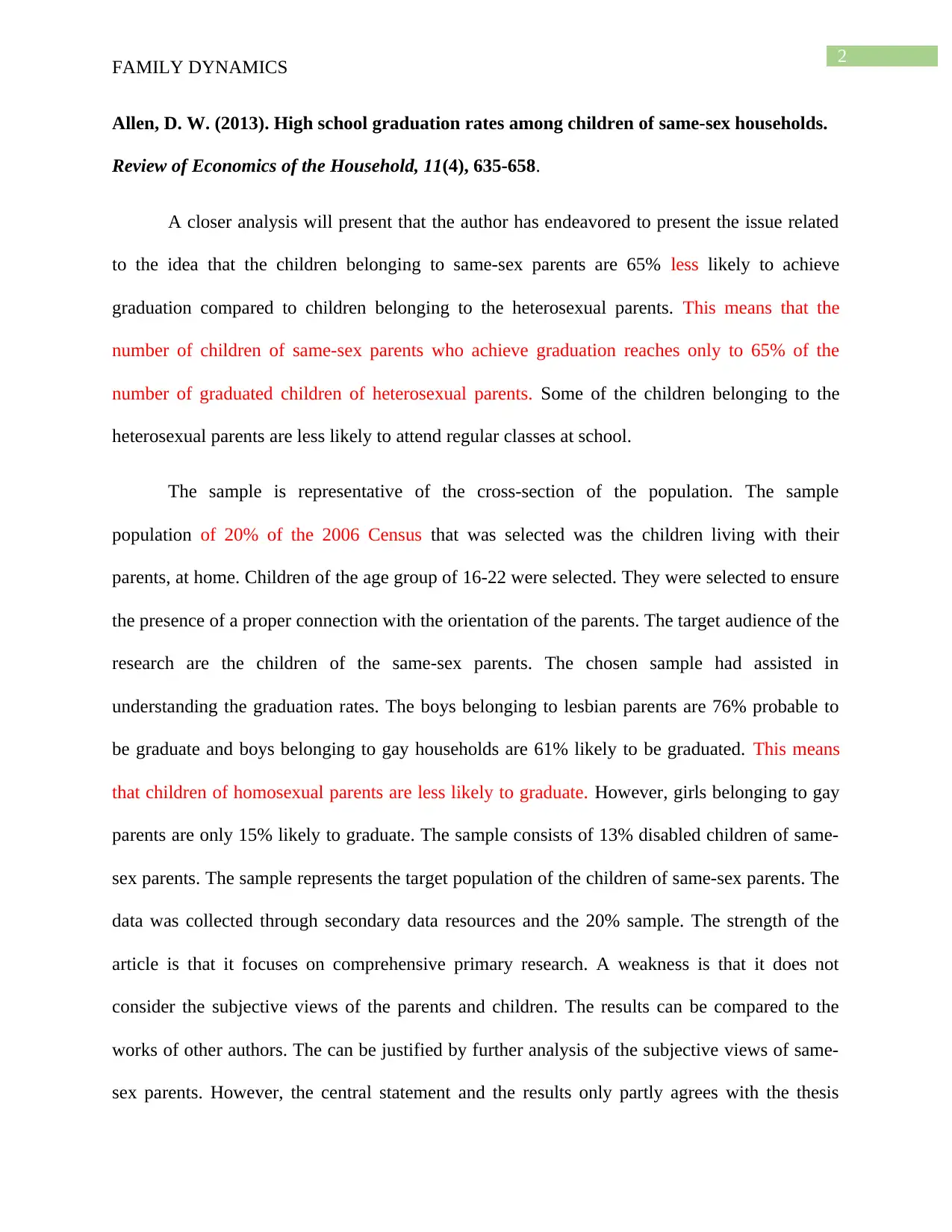
2
FAMILY DYNAMICS
Allen, D. W. (2013). High school graduation rates among children of same-sex households.
Review of Economics of the Household, 11(4), 635-658.
A closer analysis will present that the author has endeavored to present the issue related
to the idea that the children belonging to same-sex parents are 65% less likely to achieve
graduation compared to children belonging to the heterosexual parents. This means that the
number of children of same-sex parents who achieve graduation reaches only to 65% of the
number of graduated children of heterosexual parents. Some of the children belonging to the
heterosexual parents are less likely to attend regular classes at school.
The sample is representative of the cross-section of the population. The sample
population of 20% of the 2006 Census that was selected was the children living with their
parents, at home. Children of the age group of 16-22 were selected. They were selected to ensure
the presence of a proper connection with the orientation of the parents. The target audience of the
research are the children of the same-sex parents. The chosen sample had assisted in
understanding the graduation rates. The boys belonging to lesbian parents are 76% probable to
be graduate and boys belonging to gay households are 61% likely to be graduated. This means
that children of homosexual parents are less likely to graduate. However, girls belonging to gay
parents are only 15% likely to graduate. The sample consists of 13% disabled children of same-
sex parents. The sample represents the target population of the children of same-sex parents. The
data was collected through secondary data resources and the 20% sample. The strength of the
article is that it focuses on comprehensive primary research. A weakness is that it does not
consider the subjective views of the parents and children. The results can be compared to the
works of other authors. The can be justified by further analysis of the subjective views of same-
sex parents. However, the central statement and the results only partly agrees with the thesis
FAMILY DYNAMICS
Allen, D. W. (2013). High school graduation rates among children of same-sex households.
Review of Economics of the Household, 11(4), 635-658.
A closer analysis will present that the author has endeavored to present the issue related
to the idea that the children belonging to same-sex parents are 65% less likely to achieve
graduation compared to children belonging to the heterosexual parents. This means that the
number of children of same-sex parents who achieve graduation reaches only to 65% of the
number of graduated children of heterosexual parents. Some of the children belonging to the
heterosexual parents are less likely to attend regular classes at school.
The sample is representative of the cross-section of the population. The sample
population of 20% of the 2006 Census that was selected was the children living with their
parents, at home. Children of the age group of 16-22 were selected. They were selected to ensure
the presence of a proper connection with the orientation of the parents. The target audience of the
research are the children of the same-sex parents. The chosen sample had assisted in
understanding the graduation rates. The boys belonging to lesbian parents are 76% probable to
be graduate and boys belonging to gay households are 61% likely to be graduated. This means
that children of homosexual parents are less likely to graduate. However, girls belonging to gay
parents are only 15% likely to graduate. The sample consists of 13% disabled children of same-
sex parents. The sample represents the target population of the children of same-sex parents. The
data was collected through secondary data resources and the 20% sample. The strength of the
article is that it focuses on comprehensive primary research. A weakness is that it does not
consider the subjective views of the parents and children. The results can be compared to the
works of other authors. The can be justified by further analysis of the subjective views of same-
sex parents. However, the central statement and the results only partly agrees with the thesis
⊘ This is a preview!⊘
Do you want full access?
Subscribe today to unlock all pages.

Trusted by 1+ million students worldwide
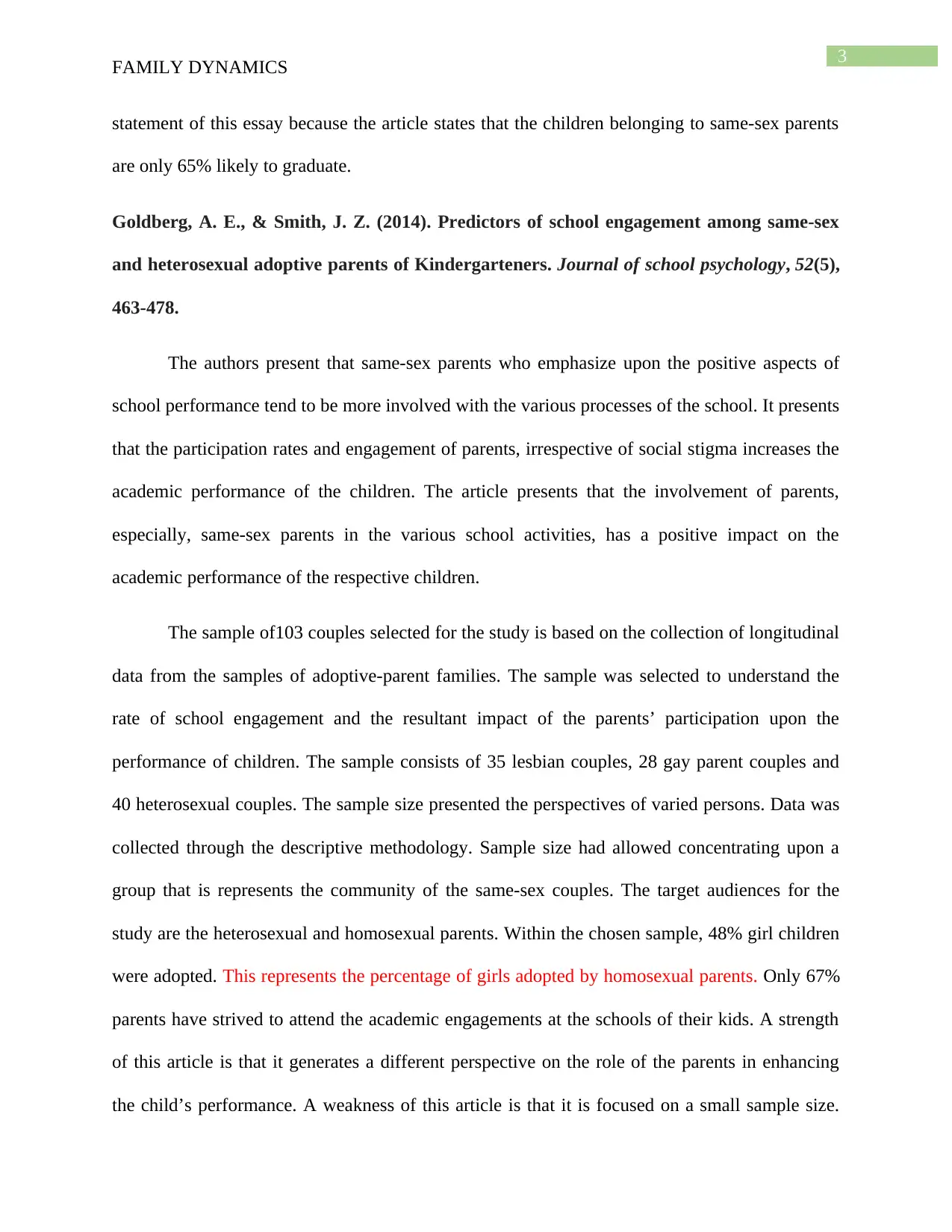
3
FAMILY DYNAMICS
statement of this essay because the article states that the children belonging to same-sex parents
are only 65% likely to graduate.
Goldberg, A. E., & Smith, J. Z. (2014). Predictors of school engagement among same-sex
and heterosexual adoptive parents of Kindergarteners. Journal of school psychology, 52(5),
463-478.
The authors present that same-sex parents who emphasize upon the positive aspects of
school performance tend to be more involved with the various processes of the school. It presents
that the participation rates and engagement of parents, irrespective of social stigma increases the
academic performance of the children. The article presents that the involvement of parents,
especially, same-sex parents in the various school activities, has a positive impact on the
academic performance of the respective children.
The sample of103 couples selected for the study is based on the collection of longitudinal
data from the samples of adoptive-parent families. The sample was selected to understand the
rate of school engagement and the resultant impact of the parents’ participation upon the
performance of children. The sample consists of 35 lesbian couples, 28 gay parent couples and
40 heterosexual couples. The sample size presented the perspectives of varied persons. Data was
collected through the descriptive methodology. Sample size had allowed concentrating upon a
group that is represents the community of the same-sex couples. The target audiences for the
study are the heterosexual and homosexual parents. Within the chosen sample, 48% girl children
were adopted. This represents the percentage of girls adopted by homosexual parents. Only 67%
parents have strived to attend the academic engagements at the schools of their kids. A strength
of this article is that it generates a different perspective on the role of the parents in enhancing
the child’s performance. A weakness of this article is that it is focused on a small sample size.
FAMILY DYNAMICS
statement of this essay because the article states that the children belonging to same-sex parents
are only 65% likely to graduate.
Goldberg, A. E., & Smith, J. Z. (2014). Predictors of school engagement among same-sex
and heterosexual adoptive parents of Kindergarteners. Journal of school psychology, 52(5),
463-478.
The authors present that same-sex parents who emphasize upon the positive aspects of
school performance tend to be more involved with the various processes of the school. It presents
that the participation rates and engagement of parents, irrespective of social stigma increases the
academic performance of the children. The article presents that the involvement of parents,
especially, same-sex parents in the various school activities, has a positive impact on the
academic performance of the respective children.
The sample of103 couples selected for the study is based on the collection of longitudinal
data from the samples of adoptive-parent families. The sample was selected to understand the
rate of school engagement and the resultant impact of the parents’ participation upon the
performance of children. The sample consists of 35 lesbian couples, 28 gay parent couples and
40 heterosexual couples. The sample size presented the perspectives of varied persons. Data was
collected through the descriptive methodology. Sample size had allowed concentrating upon a
group that is represents the community of the same-sex couples. The target audiences for the
study are the heterosexual and homosexual parents. Within the chosen sample, 48% girl children
were adopted. This represents the percentage of girls adopted by homosexual parents. Only 67%
parents have strived to attend the academic engagements at the schools of their kids. A strength
of this article is that it generates a different perspective on the role of the parents in enhancing
the child’s performance. A weakness of this article is that it is focused on a small sample size.
Paraphrase This Document
Need a fresh take? Get an instant paraphrase of this document with our AI Paraphraser

4
FAMILY DYNAMICS
The results justifies the thesis statement by revealing that the academic engagement and
performance of the children also depends on the involvement of the parents in school activities,
irrespective of the gender of the participating parents.
FAMILY DYNAMICS
The results justifies the thesis statement by revealing that the academic engagement and
performance of the children also depends on the involvement of the parents in school activities,
irrespective of the gender of the participating parents.
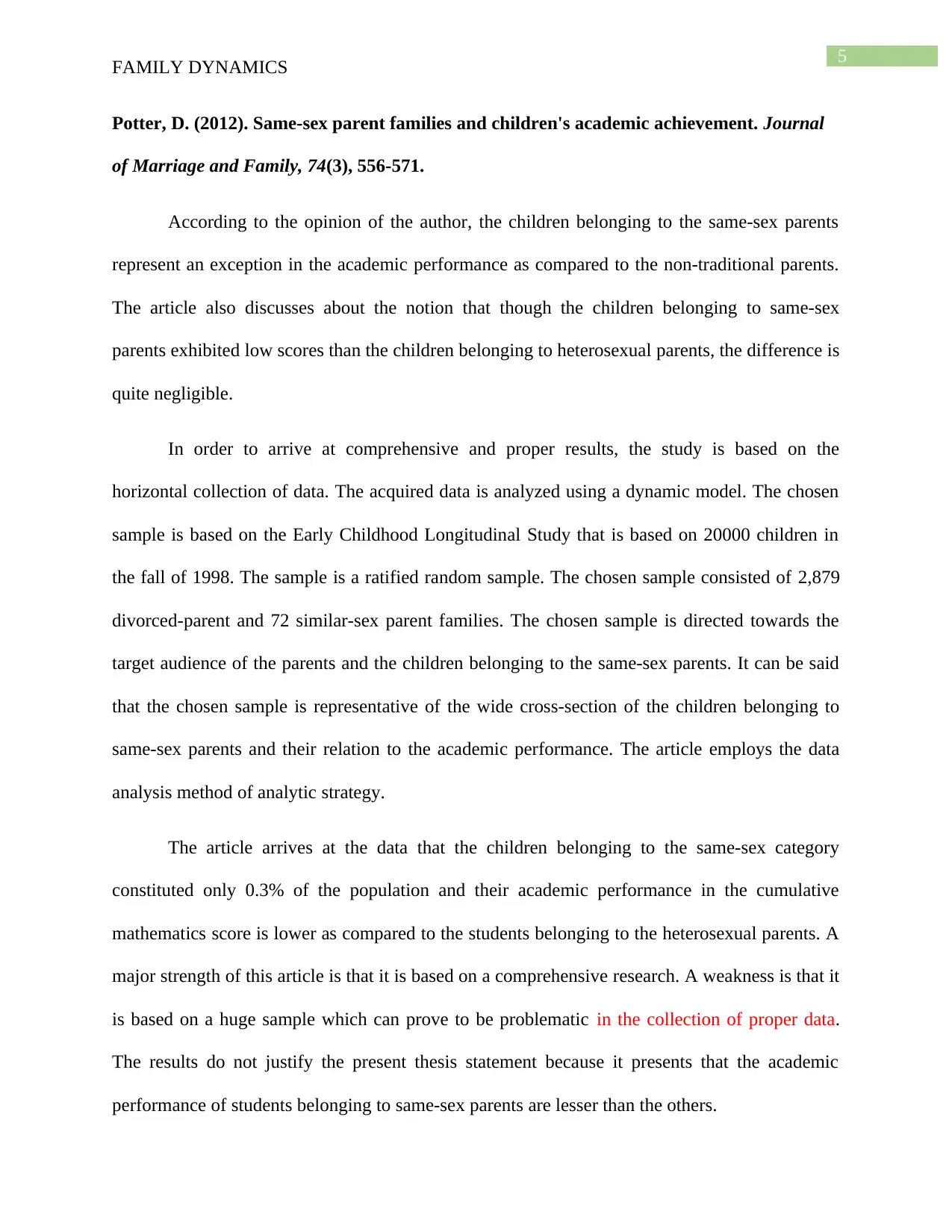
5
FAMILY DYNAMICS
Potter, D. (2012). Same-sex parent families and children's academic achievement. Journal
of Marriage and Family, 74(3), 556-571.
According to the opinion of the author, the children belonging to the same-sex parents
represent an exception in the academic performance as compared to the non-traditional parents.
The article also discusses about the notion that though the children belonging to same-sex
parents exhibited low scores than the children belonging to heterosexual parents, the difference is
quite negligible.
In order to arrive at comprehensive and proper results, the study is based on the
horizontal collection of data. The acquired data is analyzed using a dynamic model. The chosen
sample is based on the Early Childhood Longitudinal Study that is based on 20000 children in
the fall of 1998. The sample is a ratified random sample. The chosen sample consisted of 2,879
divorced-parent and 72 similar-sex parent families. The chosen sample is directed towards the
target audience of the parents and the children belonging to the same-sex parents. It can be said
that the chosen sample is representative of the wide cross-section of the children belonging to
same-sex parents and their relation to the academic performance. The article employs the data
analysis method of analytic strategy.
The article arrives at the data that the children belonging to the same-sex category
constituted only 0.3% of the population and their academic performance in the cumulative
mathematics score is lower as compared to the students belonging to the heterosexual parents. A
major strength of this article is that it is based on a comprehensive research. A weakness is that it
is based on a huge sample which can prove to be problematic in the collection of proper data.
The results do not justify the present thesis statement because it presents that the academic
performance of students belonging to same-sex parents are lesser than the others.
FAMILY DYNAMICS
Potter, D. (2012). Same-sex parent families and children's academic achievement. Journal
of Marriage and Family, 74(3), 556-571.
According to the opinion of the author, the children belonging to the same-sex parents
represent an exception in the academic performance as compared to the non-traditional parents.
The article also discusses about the notion that though the children belonging to same-sex
parents exhibited low scores than the children belonging to heterosexual parents, the difference is
quite negligible.
In order to arrive at comprehensive and proper results, the study is based on the
horizontal collection of data. The acquired data is analyzed using a dynamic model. The chosen
sample is based on the Early Childhood Longitudinal Study that is based on 20000 children in
the fall of 1998. The sample is a ratified random sample. The chosen sample consisted of 2,879
divorced-parent and 72 similar-sex parent families. The chosen sample is directed towards the
target audience of the parents and the children belonging to the same-sex parents. It can be said
that the chosen sample is representative of the wide cross-section of the children belonging to
same-sex parents and their relation to the academic performance. The article employs the data
analysis method of analytic strategy.
The article arrives at the data that the children belonging to the same-sex category
constituted only 0.3% of the population and their academic performance in the cumulative
mathematics score is lower as compared to the students belonging to the heterosexual parents. A
major strength of this article is that it is based on a comprehensive research. A weakness is that it
is based on a huge sample which can prove to be problematic in the collection of proper data.
The results do not justify the present thesis statement because it presents that the academic
performance of students belonging to same-sex parents are lesser than the others.
⊘ This is a preview!⊘
Do you want full access?
Subscribe today to unlock all pages.

Trusted by 1+ million students worldwide
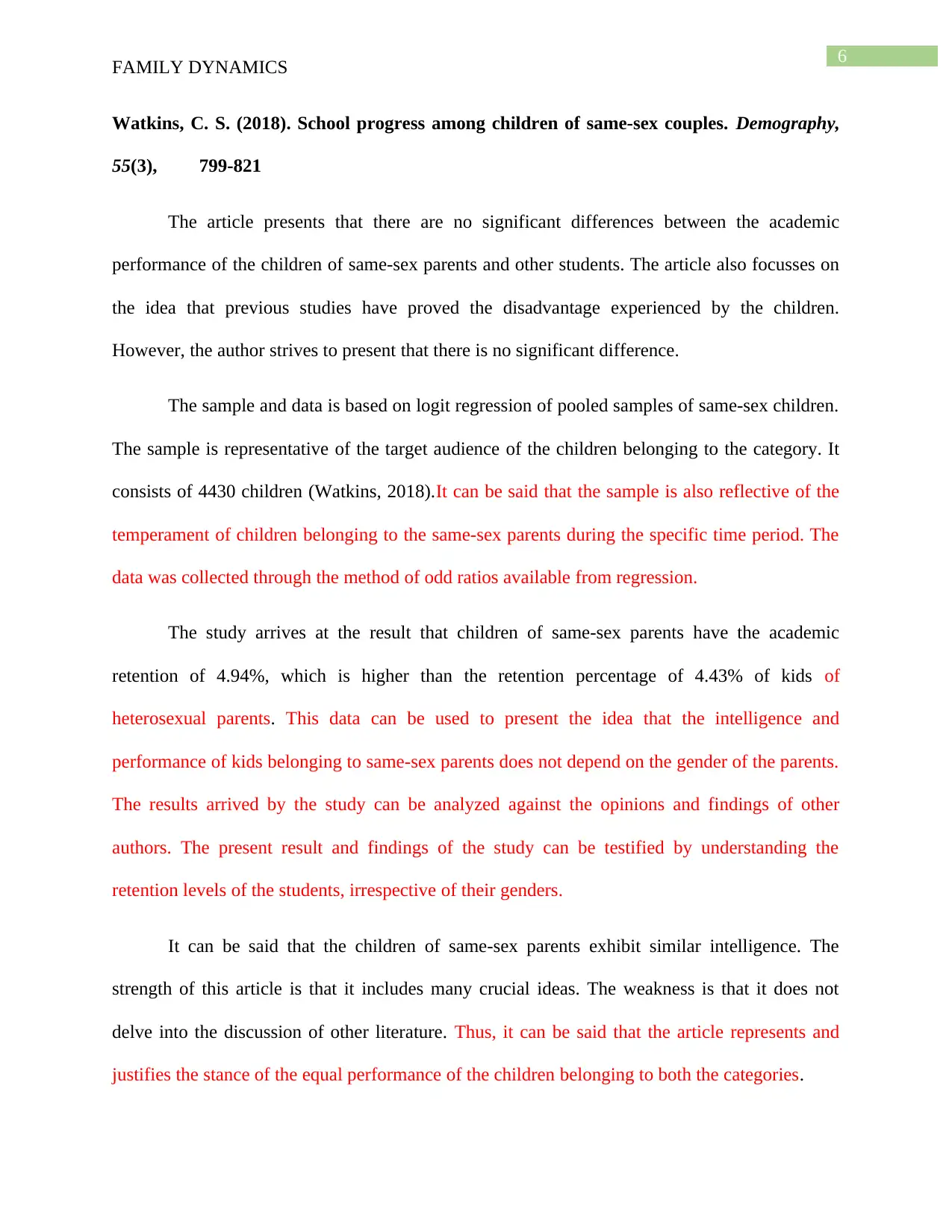
6
FAMILY DYNAMICS
Watkins, C. S. (2018). School progress among children of same-sex couples. Demography,
55(3), 799-821
The article presents that there are no significant differences between the academic
performance of the children of same-sex parents and other students. The article also focusses on
the idea that previous studies have proved the disadvantage experienced by the children.
However, the author strives to present that there is no significant difference.
The sample and data is based on logit regression of pooled samples of same-sex children.
The sample is representative of the target audience of the children belonging to the category. It
consists of 4430 children (Watkins, 2018).It can be said that the sample is also reflective of the
temperament of children belonging to the same-sex parents during the specific time period. The
data was collected through the method of odd ratios available from regression.
The study arrives at the result that children of same-sex parents have the academic
retention of 4.94%, which is higher than the retention percentage of 4.43% of kids of
heterosexual parents. This data can be used to present the idea that the intelligence and
performance of kids belonging to same-sex parents does not depend on the gender of the parents.
The results arrived by the study can be analyzed against the opinions and findings of other
authors. The present result and findings of the study can be testified by understanding the
retention levels of the students, irrespective of their genders.
It can be said that the children of same-sex parents exhibit similar intelligence. The
strength of this article is that it includes many crucial ideas. The weakness is that it does not
delve into the discussion of other literature. Thus, it can be said that the article represents and
justifies the stance of the equal performance of the children belonging to both the categories.
FAMILY DYNAMICS
Watkins, C. S. (2018). School progress among children of same-sex couples. Demography,
55(3), 799-821
The article presents that there are no significant differences between the academic
performance of the children of same-sex parents and other students. The article also focusses on
the idea that previous studies have proved the disadvantage experienced by the children.
However, the author strives to present that there is no significant difference.
The sample and data is based on logit regression of pooled samples of same-sex children.
The sample is representative of the target audience of the children belonging to the category. It
consists of 4430 children (Watkins, 2018).It can be said that the sample is also reflective of the
temperament of children belonging to the same-sex parents during the specific time period. The
data was collected through the method of odd ratios available from regression.
The study arrives at the result that children of same-sex parents have the academic
retention of 4.94%, which is higher than the retention percentage of 4.43% of kids of
heterosexual parents. This data can be used to present the idea that the intelligence and
performance of kids belonging to same-sex parents does not depend on the gender of the parents.
The results arrived by the study can be analyzed against the opinions and findings of other
authors. The present result and findings of the study can be testified by understanding the
retention levels of the students, irrespective of their genders.
It can be said that the children of same-sex parents exhibit similar intelligence. The
strength of this article is that it includes many crucial ideas. The weakness is that it does not
delve into the discussion of other literature. Thus, it can be said that the article represents and
justifies the stance of the equal performance of the children belonging to both the categories.
Paraphrase This Document
Need a fresh take? Get an instant paraphrase of this document with our AI Paraphraser
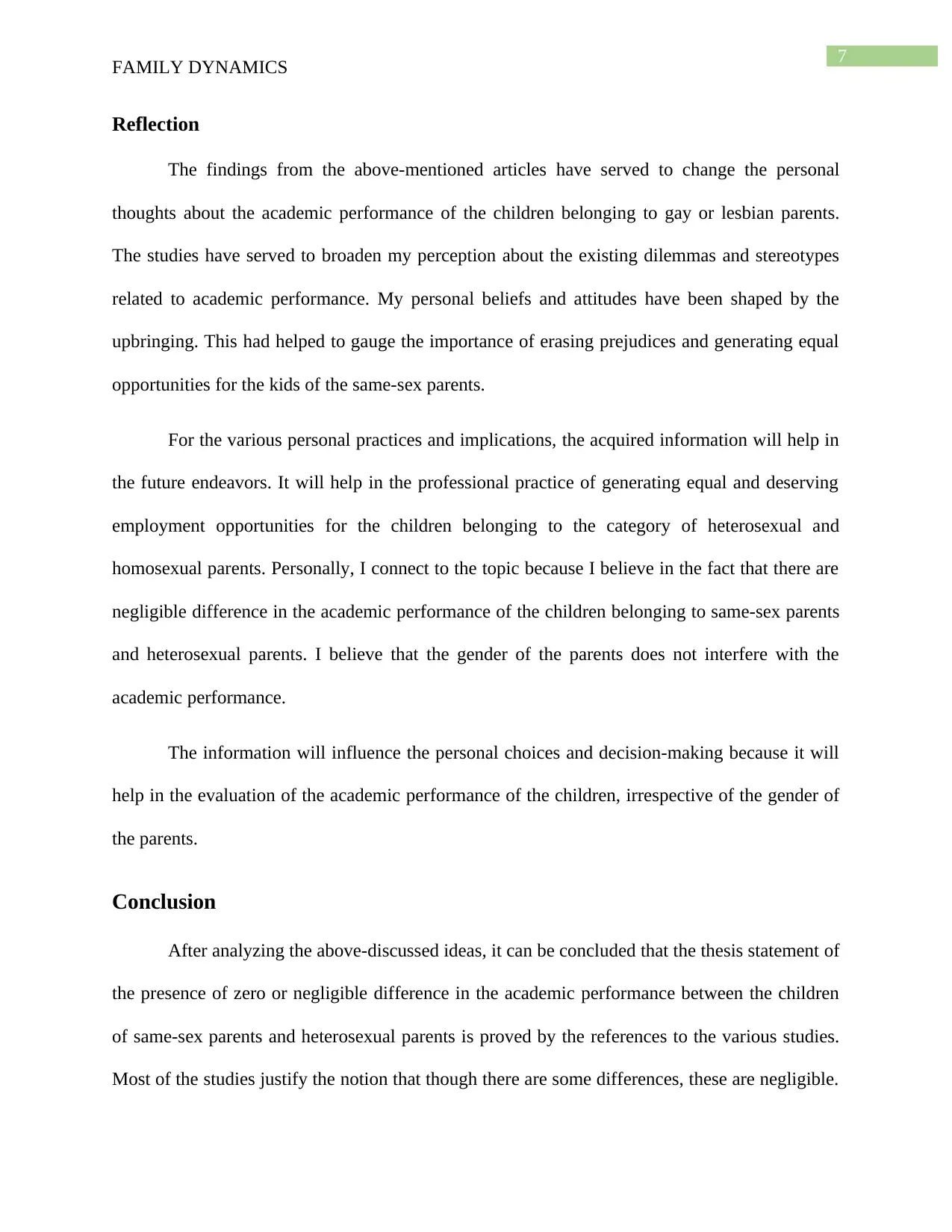
7
FAMILY DYNAMICS
Reflection
The findings from the above-mentioned articles have served to change the personal
thoughts about the academic performance of the children belonging to gay or lesbian parents.
The studies have served to broaden my perception about the existing dilemmas and stereotypes
related to academic performance. My personal beliefs and attitudes have been shaped by the
upbringing. This had helped to gauge the importance of erasing prejudices and generating equal
opportunities for the kids of the same-sex parents.
For the various personal practices and implications, the acquired information will help in
the future endeavors. It will help in the professional practice of generating equal and deserving
employment opportunities for the children belonging to the category of heterosexual and
homosexual parents. Personally, I connect to the topic because I believe in the fact that there are
negligible difference in the academic performance of the children belonging to same-sex parents
and heterosexual parents. I believe that the gender of the parents does not interfere with the
academic performance.
The information will influence the personal choices and decision-making because it will
help in the evaluation of the academic performance of the children, irrespective of the gender of
the parents.
Conclusion
After analyzing the above-discussed ideas, it can be concluded that the thesis statement of
the presence of zero or negligible difference in the academic performance between the children
of same-sex parents and heterosexual parents is proved by the references to the various studies.
Most of the studies justify the notion that though there are some differences, these are negligible.
FAMILY DYNAMICS
Reflection
The findings from the above-mentioned articles have served to change the personal
thoughts about the academic performance of the children belonging to gay or lesbian parents.
The studies have served to broaden my perception about the existing dilemmas and stereotypes
related to academic performance. My personal beliefs and attitudes have been shaped by the
upbringing. This had helped to gauge the importance of erasing prejudices and generating equal
opportunities for the kids of the same-sex parents.
For the various personal practices and implications, the acquired information will help in
the future endeavors. It will help in the professional practice of generating equal and deserving
employment opportunities for the children belonging to the category of heterosexual and
homosexual parents. Personally, I connect to the topic because I believe in the fact that there are
negligible difference in the academic performance of the children belonging to same-sex parents
and heterosexual parents. I believe that the gender of the parents does not interfere with the
academic performance.
The information will influence the personal choices and decision-making because it will
help in the evaluation of the academic performance of the children, irrespective of the gender of
the parents.
Conclusion
After analyzing the above-discussed ideas, it can be concluded that the thesis statement of
the presence of zero or negligible difference in the academic performance between the children
of same-sex parents and heterosexual parents is proved by the references to the various studies.
Most of the studies justify the notion that though there are some differences, these are negligible.
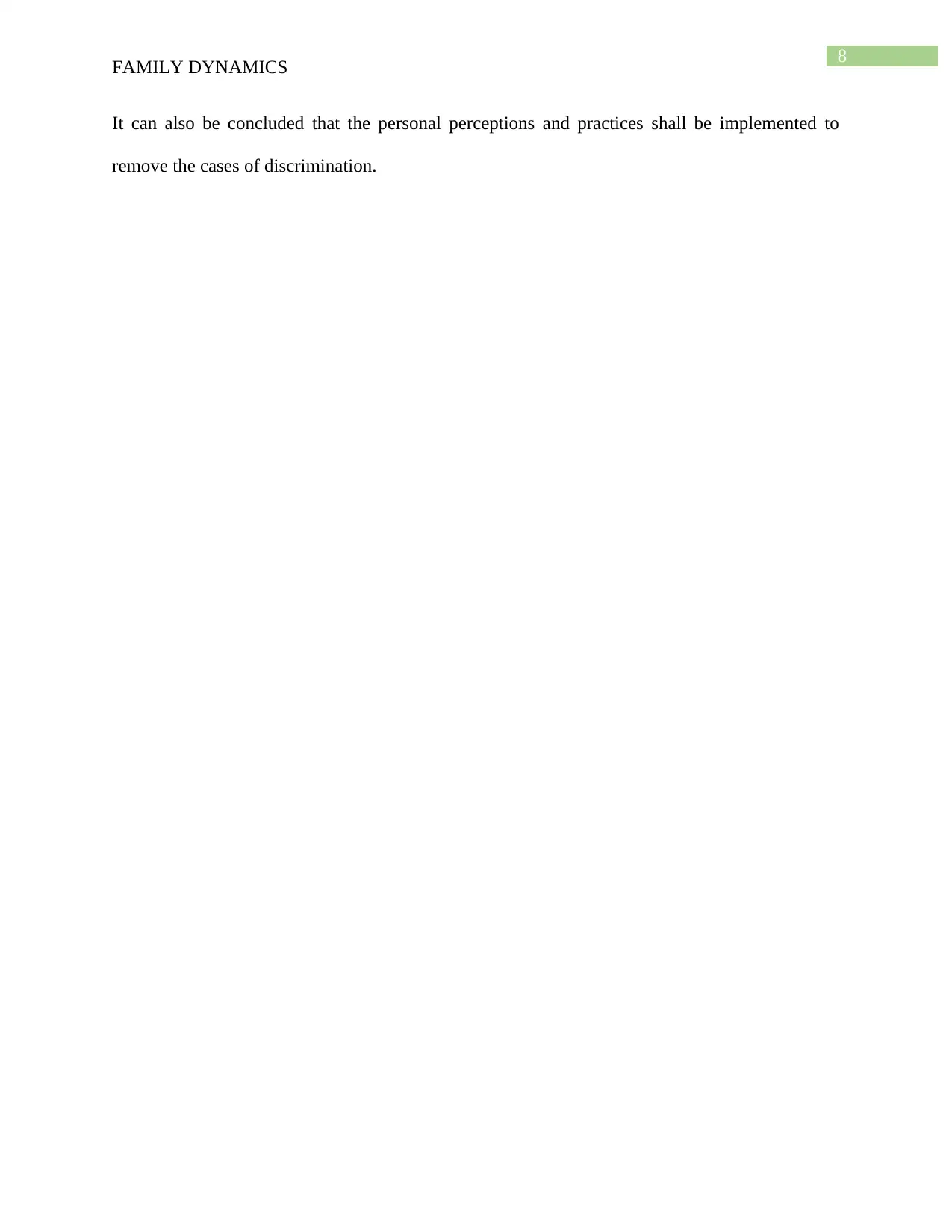
8
FAMILY DYNAMICS
It can also be concluded that the personal perceptions and practices shall be implemented to
remove the cases of discrimination.
FAMILY DYNAMICS
It can also be concluded that the personal perceptions and practices shall be implemented to
remove the cases of discrimination.
⊘ This is a preview!⊘
Do you want full access?
Subscribe today to unlock all pages.

Trusted by 1+ million students worldwide
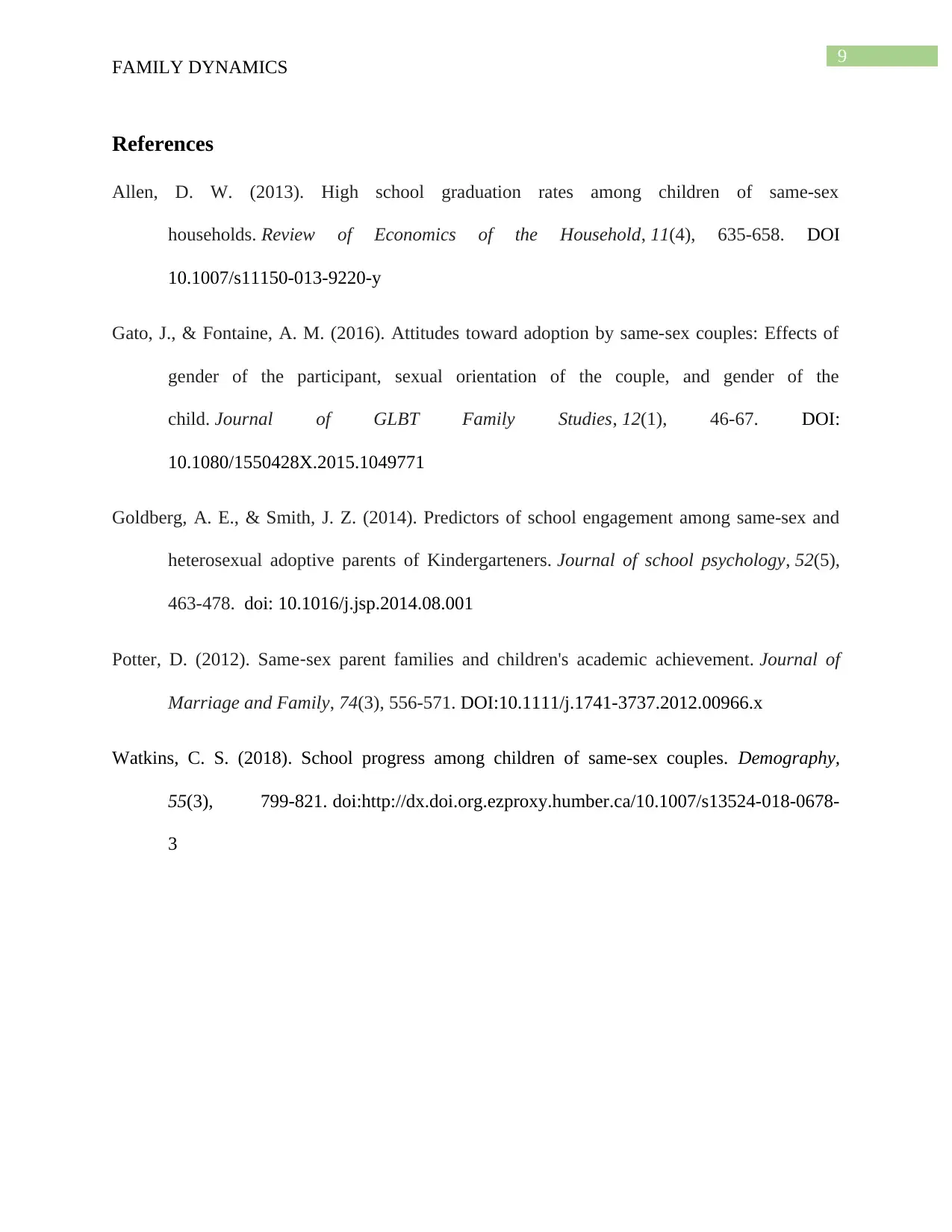
9
FAMILY DYNAMICS
References
Allen, D. W. (2013). High school graduation rates among children of same-sex
households. Review of Economics of the Household, 11(4), 635-658. DOI
10.1007/s11150-013-9220-y
Gato, J., & Fontaine, A. M. (2016). Attitudes toward adoption by same-sex couples: Effects of
gender of the participant, sexual orientation of the couple, and gender of the
child. Journal of GLBT Family Studies, 12(1), 46-67. DOI:
10.1080/1550428X.2015.1049771
Goldberg, A. E., & Smith, J. Z. (2014). Predictors of school engagement among same-sex and
heterosexual adoptive parents of Kindergarteners. Journal of school psychology, 52(5),
463-478. doi: 10.1016/j.jsp.2014.08.001
Potter, D. (2012). Same‐sex parent families and children's academic achievement. Journal of
Marriage and Family, 74(3), 556-571. DOI:10.1111/j.1741-3737.2012.00966.x
Watkins, C. S. (2018). School progress among children of same-sex couples. Demography,
55(3), 799-821. doi:http://dx.doi.org.ezproxy.humber.ca/10.1007/s13524-018-0678-
3
FAMILY DYNAMICS
References
Allen, D. W. (2013). High school graduation rates among children of same-sex
households. Review of Economics of the Household, 11(4), 635-658. DOI
10.1007/s11150-013-9220-y
Gato, J., & Fontaine, A. M. (2016). Attitudes toward adoption by same-sex couples: Effects of
gender of the participant, sexual orientation of the couple, and gender of the
child. Journal of GLBT Family Studies, 12(1), 46-67. DOI:
10.1080/1550428X.2015.1049771
Goldberg, A. E., & Smith, J. Z. (2014). Predictors of school engagement among same-sex and
heterosexual adoptive parents of Kindergarteners. Journal of school psychology, 52(5),
463-478. doi: 10.1016/j.jsp.2014.08.001
Potter, D. (2012). Same‐sex parent families and children's academic achievement. Journal of
Marriage and Family, 74(3), 556-571. DOI:10.1111/j.1741-3737.2012.00966.x
Watkins, C. S. (2018). School progress among children of same-sex couples. Demography,
55(3), 799-821. doi:http://dx.doi.org.ezproxy.humber.ca/10.1007/s13524-018-0678-
3
1 out of 10
Your All-in-One AI-Powered Toolkit for Academic Success.
+13062052269
info@desklib.com
Available 24*7 on WhatsApp / Email
![[object Object]](/_next/static/media/star-bottom.7253800d.svg)
Unlock your academic potential
Copyright © 2020–2026 A2Z Services. All Rights Reserved. Developed and managed by ZUCOL.